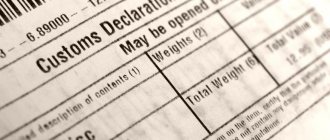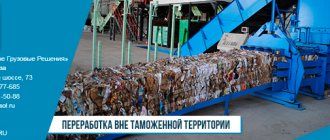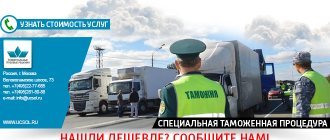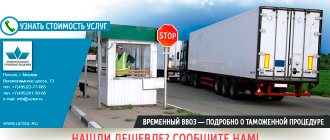Customs procedure for duty-free trade
Duty-free trade literally means carrying out foreign trade transactions that are not subject to customs duties. In this sense, duty-free trade is one of the types of trade and political regime, which is established by multilateral or bilateral international agreements and provides for the implementation of foreign trade transactions without the imposition of customs duties. In foreign trade policy, a duty-free trade regime can apply both to the entire range of goods in foreign trade relations, and to some individual goods or groups of goods.
An example of such a regime in international economic relations can be the foreign trade regime of a free trade zone - the initial stage of economic integration of several states, which involves the implementation of duty-free mutual trade. In other words, only mutual trade, that is, trade operations between the states parties to the free trade agreement, is carried out without collecting customs duties. As for the foreign trade operations of a state party to a free trade agreement with a third state not participating in this integration project (agreement on the creation of a free trade zone), they are subject to customs duties and taxes (VAT, excise taxes).
Duty-free trade, an institution of customs law, one of the customs procedures provided for by law, should be distinguished from duty-free trade as an institution of international economic law, a type of trade and political regime of international trade.
The difference between these two instruments of modern international trade is manifested, first of all, in their legal nature. If the trade and political regime of duty-free trade is of a conventional nature and is established by concluding a corresponding multilateral or bilateral international treaty, then the customs procedure of duty-free trade is of an autonomous nature, it is applied in accordance with the requirements of the customs legislation of a particular state or the Customs Union.
The customs procedure for duty-free trade involves the localized implementation of foreign trade operations without paying customs duties and taxes, as well as without the use of non-tariff regulation measures.
The localization of duty-free trade as a customs procedure is manifested in the fact that such trade, as a rule, is territorially limited (localized) and applies to limited (established by law) groups of persons.
Firstly, goods that are sold at retail in duty-free stores to individuals leaving the customs territory of the Customs Union may be placed under the customs procedure of duty-free trade.
Secondly, the object of application of the customs procedure for duty-free trade may be the sale of goods:
- foreign diplomatic missions;
- representative offices of international organizations equivalent to them;
- consular offices;
- diplomatic agents and members of their families;
- consular officials and members of their families.
Note that in the Customs Code of the Russian Federation of 1993 and the Customs Code of the Russian Federation of 2003, the corresponding customs procedure was understood exclusively as the sale of goods at retail in duty-free stores to individuals leaving the customs territory. For example, in the Customs Code of the Russian Federation of 2003 (Article 258), this customs procedure was defined as follows: “Duty-free trade is a customs regime under which foreign goods imported into the customs territory of the Russian Federation, or Russian goods are sold at retail to individuals, traveling outside the customs territory of the Russian Federation, directly in duty-free stores without paying customs duties, taxes, as well as without applying prohibitions and restrictions of an economic nature to goods established in accordance with the legislation of the Russian Federation on state regulation of foreign trade activities.”
In the Customs Code of the Russian Federation of 1993 (Article 52), this customs procedure was not called “duty-free trade,” but rather a “duty-free store”: “A duty-free store is a customs regime under which goods are sold under customs control on the customs territory of the Russian Federation ( at airports, ports open for international traffic, and other places determined by the customs authorities of the Russian Federation) without levying customs duties, taxes and without applying economic policy measures to goods.”
In the original version of the Customs Code of the Customs Union, the customs procedure was also understood exclusively as retail trade carried out in duty-free stores. And only after some time, by the Protocol of April 16, 2010 “On Amendments and Additions to the Treaty on the Customs Code of the Customs Union dated November 27, 2009,” the norm defining the content of the customs procedure was supplemented with provisions according to which this customs procedure may goods sold to foreign diplomatic missions, equivalent representative offices of international organizations, consular offices, as well as diplomatic agents, consular officials and members of their families who live with them are placed.
Note. The Protocol was ratified by Federal Law No. 113-FZ of June 2, 2010 “On the ratification of the Protocol on Amendments and Additions to the Treaty on the Customs Code of the Customs Union of November 27, 2009.”
Ratification
The FTA was ratified by Russia (April 1, 2012), Belarus (May 26, 2012), and Ukraine (August 9, 2012). In the fall of 2012, the treaty was ratified by Armenia, Moldova and Kazakhstan, and in December 2013 by Kyrgyzstan. For Russia, Belarus and Ukraine, the agreement entered into force on September 20, 2012, for Armenia - on October 17, for Kazakhstan and Moldova - on December 8 and 9, 2012, respectively, for Kyrgyzstan - on January 12, 2014.
On June 4, 2012, in Tashkent, the presidents of Russia and Uzbekistan, Vladimir Putin and Islam Karimov, signed a declaration on deepening the strategic partnership and a memorandum of understanding. On May 31, 2013, in Minsk, at a meeting of the Council of Heads of Government of the CIS, a protocol was signed on the application of the FTA Agreement between the parties and the Republic of Uzbekistan. The document established special conditions for Uzbekistan’s accession to the treaty.
In particular, until December 31, 2021 or until Uzbekistan joins the WTO (whichever of these dates occurs earlier), the parties to the agreement were released from the obligation to provide national treatment in mutual trade. The procedure for resolving controversial issues on the basis of bilateral negotiations is also preserved.
Tajikistan has not ratified the FTA agreement.
Conditions for placing goods under the customs procedure
In accordance with Art. 303 of the Customs Code of the Customs Union, any goods can be placed under the customs procedure of duty-free trade, except:
- goods prohibited for import into the customs territory of the Customs Union, as well as export outside the customs territory of the Customs Union;
- goods prohibited for circulation in the territories of the CU member states;
- goods used to ensure the functioning of a duty-free store (commercial equipment, refrigerators, etc.);
- goods that cannot be placed under the customs procedure of refusal in favor of states in accordance with the decision of the Eurasian Economic Commission.
The list of goods not subject to placement under the customs procedure of duty-free trade was established by decision of the Customs Union Commission dated September 20, 2010 N 375 “On some issues of application of customs procedures.” It includes goods that cannot be placed under the customs procedure of duty-free trade:
- military products, ammunition, military equipment, narcotic and psychotropic substances;
- goods for industrial and military-technical purposes;
- heavy goods (weighing more than 20 kg) and bulky goods (with the sum of the dimensions in length, width and height more than 200 cm);
- undenatured ethyl alcohol;
- goods for retail trade, not packaged in consumer containers;
- goods of the vehicle subject to export customs duties or in respect of which prohibitions and restrictions have been established.
With regard to the last category of goods prohibited from being placed under the customs regime of duty-free trade, two clarifications must be made.
Firstly, the Unified List of Goods to which bans or restrictions on import or export are applied by the CU member states in trade with third countries was approved by the decision of the Board of the Eurasian Economic Commission dated August 16, 2012 N 134 “On regulatory legal acts in the field of non-tariff regulation." Such goods include, for example, ozone-depleting substances, certain types of timber, toxic substances, some types of medicines, goods for the export of which an exclusive right has been established (natural gas, mineral or chemical fertilizers), etc.
Secondly, the prohibition on placing under the customs procedure of duty-free trade of goods of the vehicle, subject to export customs duties or in respect of which prohibitions and restrictions have been established, is not unconditional. The same decision of the Board of the Eurasian Economic Commission contains a List of goods belonging to this category, but which can still be placed under the customs procedure of duty-free trade. We are talking about products such as:
- products from fish and crustaceans, mollusks and other aquatic invertebrates, caviar and products made from it (except sturgeon caviar), packaged for retail sale and ready for immediate consumption, with a net weight of no more than 0.5 kg;
- caviar of sturgeon species in packaging with a net weight of not more than 0.25 kg, specially labeled in accordance with the Convention of March 3, 1973 on International Trade in Endangered Species of Wild Fauna and Flora;
- medicines used for medical purposes without a doctor's prescription and registered in accordance with the established procedure in the CU member states, in packages for retail sale (including provitamins, vitamins, hormones and antibiotics);
- souvenirs or handicrafts made from paper pulp, wooden or metal materials.
The conditions for placing goods under the customs procedure of duty-free trade in accordance with the customs legislation of the Customs Union (Article 304 of the Customs Code of the Customs Union) are the following features of the declaration procedure:
- firstly, only the owner of the duty-free store in which these goods will be sold can act as a declarant of goods;
- secondly, CU goods are placed under the customs procedure of duty-free trade only by submitting a customs declaration. This applies to the situation when a Russian organization, the owner of a duty-free store, intends to sell Customs Union goods in its store. Placement under the duty-free trade procedure is impossible in such a situation through the submission of neither transport documents nor commodity (commercial) documents, but only through the submission of a customs declaration for goods to the customs authority.
How does cross-border trade affect the economy?
Cross-border trade is not only an important factor in the development of modern retail, but also stimulates competition within the industry, HSE specialists note in their study.
The ability of Russian consumers to place online orders in other countries helps smooth out regional imbalances in retail trade. Today, the leaders in the number of incoming international parcels per capita are not only Moscow and St. Petersburg, but also cities in the northern regions and small towns in industrialized areas: if on average in Russia this figure in 2021 was 2.4 parcels per person, then in Salekhard, for example, 14.8 parcels.
The rapid growth of online trading and cross-border online trading in Russia in the 2010s was associated with the low base effect and will slow down as the market becomes saturated, the Higher School of Economics states. According to its experts, Russia still lags behind European countries in terms of the number of parcels per capita: for example, in the UK, residents receive twice as many parcels, and in the Netherlands - three times.
Processing international shipments is one of the main factors in increasing profitability for international postal operators. Handling such parcels accounts for 20% of Russian Post’s revenue, according to the HSE. The highest figure is for German postal operators - 69%.
Duty-free shop according to the legislation of the Russian Federation on customs affairs
Regarding the functioning of duty-free shops in the single customs territory, the customs legislation of the Customs Union (Article 304 of the Customs Code of the Customs Union) transfers the corresponding rule-making powers to the level of the member states of the Customs Union. Acts of national legislation of the CU member states determine:
- requirements for duty-free shops regarding their location, equipment and equipment;
- operating procedures for duty-free shops;
- rules for selling goods in duty-free stores;
- the procedure for maintaining records and submitting reports in relation to goods placed under the customs procedure of duty-free trade.
In the Russian Federation, the requirements for the arrangement, equipment and location of a duty-free store are established in Art. 84 of the Federal Law “On Customs Regulation in the Russian Federation”.
The premises of a duty-free store consist of sales areas, utility rooms, and warehouses, which must be equipped in such a way as to ensure the safety of goods and the possibility of carrying out customs control regarding them. A general requirement is established for all duty-free store premises, according to which they must be located in such a way as to exclude any possibility of the entry or withdrawal of goods outside of customs control.
The territory of a duty-free store should not include objects not related to its functioning and ensuring its operation.
The use of duty-free shop premises for storage and sale of goods not declared for the duty-free customs procedure is not permitted.
Trading halls . The sale of goods can be carried out exclusively in the trading floors of a duty-free store, which must be located in such a way as to exclude the possibility of leaving goods purchased in a duty-free store on the customs territory of the Customs Union, including by transferring them to individuals remaining in this territory .
Trading areas must be located outside the place designated for customs control of goods exported by individuals when these persons move across the customs border of the Customs Union. In addition, they must be located in such a way that the possibility of access to these halls by individuals entering the customs territory of the Customs Union is excluded.
The utility rooms and warehouse of the duty-free store must be arranged and equipped in such a way as to prevent unauthorized persons from accessing the goods located in these premises, as well as to ensure the possibility of applying customs identification means to these premises.
Note. Unauthorized persons are defined as persons who are not employees of the duty-free store, who do not have authority over the goods, or who are not representatives of persons who have authority.
The warehouse of a duty-free store can only be a premises; The use of open areas for this purpose is not permitted. The warehouse may be located outside the places where goods are moved across the customs border of the Customs Union, but within the region of activity of the customs authority in which the duty-free store operates.
The warehouse must have weighing equipment with different weighing limits, providing the ability to weigh the goods sold.
In such a warehouse, corridors for the passage of persons, vestibules, vestibules, administrative, household and technical premises, as well as places for storing packaging and strapping materials, technological equipment, inventory, containers, cleaning machines, and packaging waste cannot be located.
In accordance with Art. 81 of the Federal Law “On Customs Regulation in the Russian Federation”, the owner of a duty-free shop can only be a Russian legal entity included in the register of owners of duty-free shops.
A legal entity is recognized as the owner of a duty-free shop after being included in the register of duty-free shop owners. Customs authorities maintain registers of owners of duty-free shops and ensure their periodic publication at least once a quarter, including using information technology.
The owner of a duty-free shop is entrusted with a number of responsibilities (Article 36 of the Customs Code of the Customs Union), failure to comply with which entails legal liability under the legislation of the Russian Federation, as well as exclusion from the register of owners of duty-free shops. These responsibilities are:
- to ensure the safety of goods placed under the customs procedure of duty-free trade;
- to comply with established conditions and requirements established by customs legislation;
- to ensure the possibility of customs control;
- on keeping records of the receipt of goods at the duty-free store and their sale, as well as on submitting reports on such goods to the customs authorities;
- for payment of customs duties and taxes due in connection with the placement of goods under the customs regime of duty-free trade;
- to inform the customs authority that included the legal entity in the register of owners of duty-free shops about changes in previously declared information (five days are allotted to fulfill this obligation).
Completion of the customs procedure
The customs procedure for duty-free trade ends in one of two ways.
Firstly, the completion of the customs procedure can be the retail sale of goods placed under this customs procedure in duty-free stores. In this case, the goods can be sold either to individuals leaving the customs territory of the Customs Union, or to foreign diplomatic missions, consular offices, diplomatic agents, consular officials and members of their families who live with them. This method of completing the customs procedure reflects the very essence of the customs procedure and corresponds to the purpose of duty-free shops.
Secondly, the customs procedure for duty-free trade can be completed by placing goods under other customs procedures, for example: a customs warehouse, refusal in favor of the state, destruction, etc. For certain types of goods, the choice of a different procedure for completing the duty-free trade procedure becomes quite obvious. For example, in order to complete the customs procedure for duty-free trade, food products with an expired shelf life are subject to placement under the customs procedure of destruction.
Particular attention should be paid to the peculiarities of completing the customs procedure for duty-free trade in connection with the cessation of the activity of a duty-free store. In this case, goods placed under the customs procedure of duty-free trade are subject to placement under another customs procedure within one month from the day following the day the store ceases to operate. If within the established period the goods were not placed under another customs procedure, then they are subject to detention by customs authorities in accordance with the requirements of the Customs Code of the Customs Union (Chapter 21 “Detention of goods and documents on them during customs control”).










